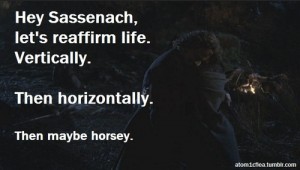 Since book-touring is done (thank GOD!) and the show is on hiatus, we have a bit of time to stop, think, and catch up on the email…
Since book-touring is done (thank GOD!) and the show is on hiatus, we have a bit of time to stop, think, and catch up on the email…
So—I thought I might address a few recent comments and questions on Episode 8. Not to refute people’s opinions—everyone’s entitled to think as they like, and say so—but just to show you a bit about How Things Work.
While most people were riveted—as they should have been; it was a terrific episode—there were a few who were upset at things they perceived to be "missing"—these including:
-
Scenes of one-on-one dialogue between Jamie and Claire
-
More scenes of intimacy
-
Claire patching people up and doing healing
-
And specifically… the "waterweed" scene following the Grants’ raid.
(One person also thought we should have seen the redcoats stalking Claire, rather than have them pop out abruptly to seize her as she reaches for the stone.)
And there were a number of questions regarding the "Deserter" scene—mostly as to whether Claire had actually been raped or not (and if she had, what kind of doofus was Jamie for going off to talk to Dougal instead of tenderly cradling her and soothing her, etc.).
OK.
As I replied to one such commenter:
"Well….your comments pinpoint the major difference between Book and Show: Time.
ALL the things you wanted to see—one on one Jamie and Claire, more scenes of intimacy, relationship building, Claire patching people up, etc.—ALL of them, are things that would require extended chunks of time (‘extended,’ in a TV show, is anything that lasts more than 60 seconds). None of these things are ‘action,’ none of them move the plot in any direct way.
The show has 52-55 minutes in which to do everything that has to be done. They don’t have time to do nice-but-nonessential "Oh, wait while I triage the whole group, bandage Angus’s scorched hand and reset Ned Gowan’s tooth," or "Oh, my God, I know we just had sex, but let’s do it again…"
In short…if you want more of all those things—you can have ‘em. In the book. <g>"
Now, a successful adaptation is always balancing the needs of the story versus the exigencies of the form. As Andrew Marvell notes to "His Coy Mistress,"— "Had we but world and time, this coyness, mistress, were no crime…" I have world and time in a novel; pretty much all I want. I can shape the story to fit my own notion of pace, rhythm, focus and climax. So can a show-runner and his gang of writers—but they don’t have world and time. They have to decide what’s essential, and then shape the story to the time available and to the necessity for each 55-minute episode to have a satisfying dramatic arc of its own.
So—
(in reply to the person complaining about the redcoats’ abrupt appearance):
"But…the redcoats came out of ‘nowhere’ in the book, as well, when they pull Claire out of the stream. It isn’t that they aren’t ‘there’—it’s that in neither case does Claire see them, because she’s so totally focused on her goal…and we’re in her head, so we don’t see them, either.
To have shown the soldiers sneaking in from the side, while Claire was laboring up the hill, calling for Frank, would have given us a different sort of suspense in the scene—but would have been a distraction from the growing sense of desperate hope between Claire and Frank. And that was the true point of the scene.
See, one of the main tools of good story-telling is focus; getting the reader/viewer to look where you want them to look. And physical reality is really a pretty small part of that. The fact that X must have been there may be logical—but it isn’t relevant, so you don’t show it. Q.E.D. <g>"
Now, the focus of that scene is really what’s controlling it, and thus dictating changes from the book. Several people expressed disappointment at not seeing Claire fall into the water and be pulled out by the redcoats. Amusing as that might have been, it’s merely a way of interrupting her headlong rush toward the stones and getting her into Captain Randall’s clutches. The way it was done instead accomplishes that same plot goal—but also makes a very solid and dramatic point about her longing for Frank and his for her. So the adapted form is not detracting from the original version; in fact, it’s adding to it, and giving us a really good two-for-one, combining plot and character development/backstory reminder.
When Ron and I met in New York for the first-ever Outlander Fan Event, we shared a long cab-ride to the event, during which we talked Book. I told him why the flowers at Craigh na Dun are forget-me-nots and why the ghost is there (and no, I’m not telling you guys; you’ll find out, eventually <g>), and he told me about his vision of that scene with Claire and Frank approaching the stones from either side. I thought that was a great idea and said so.
See, that’s something that I couldn’t have done in the book, because it’s told entirely from Claire’s point of view. We can’t see what Frank was doing and going through after Claire disappeared. I preserved Claire’s worry about/attachment to Frank by having her think about him and grieve for him periodically—but that’s all internal; the only way of doing internal monologue in a visual medium is voice-overs, and I think y’all would agree that it’s best to keep that technique to a minimum…
But it’s simple to change time, place and viewpoint in a visual medium; one shot and you’re there. Also, since you’re working in a constrained time-space, the balance of viewpoints is easier to manage.
Technically, it’s possible to use multiple viewpoints in a book — (in fact, I got a note from one of my editors (regarding a chunk of MOBY I’d sent him) saying, "Congratulations… I think you’ve just done the literary equivalent of juggling half a dozen chainsaws.") — but OUTLANDER was my first book, written for practice, and I wasn’t out to make things too complicated. Had I used flashbacks of Frank’s life in the context of a book of that size, they’d either be overwhelming, or trivial distractions. Used in the context of a 55-minute TV episode, they were beautifully balanced against Claire’s 18th century life.
In addition, there’s a visceral punch to seeing Frank’s actions that gives you an instant emotional investment in him and his story. I probably have the chops to do such a thing effectively in print now, but I didn’t when I wrote OUTLANDER (and in fact, I wouldn’t have thought of doing it; I wanted most of the focus on Jamie and the 18th century, both because that’s where most of the color and action and Story was, but also to assist the reader in falling in love with Jamie along with Claire, so that we would understand her later choices. But just as the visual invests the viewers in Frank, it does the same for Jamie—are we in any doubt, following "The Wedding" that Claire is falling in love with him?).
See, a visual medium speeds things up. You don’t necessarily need the longer build-up that you have in text, because the images are much more immediate, and easier for the audience to absorb in an emotional way.
OK, moving on to the was-it-rape? scene and the aftermath…
Well, the people who’ve read the book (and remember it <g>) know it was attempted rape. Claire grabbed her attacker around the neck while he was fumbling for a, um, connection, pulled him down and stabbed him in the kidney—but he never did succeed in penetrating her.
The TV-only people probably think he did succeed because one of the "warnings" at the beginning was an "R" for "Rape," even though there isn’t one in the episode. Now, whether whoever put the warning on thought that’s what happened, or whether it’s merely a "trigger" warning (i.e., people with a sensitivity to scenes of sexual assault might want to know there is such a scene in this episode)…I don’t know.
But this is one of those things where stuff from the book actually can’t be shown adequately. It’s absolutely clear from the book, because we’re in Claire’s head, and we know what she was perceiving. But the shot can’t be under her skirt—and unless they put in a line where Claire tells Jamie, "Don’t worry, he didn’t manage to get it in…" (which would not only be crude, but would grossly undercut her—and the audience’s—sense of shock and dislocation)…then it’s not going to be clear to viewers, who will have to be left to draw their own conclusions.
Same diff with the "waterweed" scene. This is a scene in the book that occurs between the fight with the Grants and the men instructing Claire next morning in the art of killing people. It’s a very vivid scene (sufficiently vivid that the U.K. editor asked me to remove it from her edition of the book, she thinking it "too graphic" for her audience. <cough> So this scene is in OUTLANDER but not in CROSS STITCH. The relevant part of the scene is available below, for convenient reference), and extremely memorable to readers, many of whom complained about its omission in the episode.
I didn’t discuss the decision to omit this scene with the production team, both because I try not to nitpick them, and because I could easily see why it was omitted:
-
It doesn’t advance the plot or develop an important bit of character. It reaffirms Jamie and Claire’s strong sense of/need for each other, but there are a lot of other scenes that do that (we see one within the next five minutes). Ergo, it’s not necessary. (And that consideration is why I reluctantly agreed to remove the scene from the U.K. book. Its removal didn’t damage the plot structure or deprive us of anything we really needed. In that respect, it’s one of only two scenes in OUTLANDER that aren’t structurally attached to something else (the Loch Ness monster scene is the other one)).
-
See remarks above about time. Including this scene would have meant leaving out something else; and everything in this episode is necessary to the purpose intended by the writer/production team.
-
The scene wouldn’t have been nearly as effective on film as it is on the page—and the reasons have to do with Claire’s subjective sensory perceptions. You simply can’t show most of what she’s experiencing without it being pornography (and even so, there’s no possible way of showing a man’s testicles contracting at the moment of orgasm, no matter how professionally accommodating your actor may be). But you can describe it, vividly and straightforwardly in text, without it being gross. Without those subjective bits from Claire’s interior point of view, though, the scene doesn’t have either the deep sense of intimacy or the intense sensuality that you have in the book version; it’s just another sex-scene (albeit one admittedly with some fairly funny dialogue). And while some shows would likely use repetitive sex-scenes just because people will watch them… that’s luckily not a technique this show goes for. Every sex-scene you see has an emotional point or a plot point to make.
And now I really must go and do some work. <g>
-Diana
#ReadWhileYouWait #OUTLANDER #RaidersInTheRocks #NoSpoilersInThisOne
[The rent party has retired for the night, and Jamie and Claire are conversing quietly under their blankets.]
I rolled over and put my arms about his neck.
"Not as proud as I was. You were wonderful, Jamie. I’ve never seen anything like that."
He snorted deprecatingly, but I thought he was pleased, nonetheless.
"Only a raid, Sassenach. I’ve been doin’ that since I was fourteen. It’s only in fun, ye see; it’s different when you’re up against someone who really means to kill ye."
"Fun," I said, a little faintly. "Yes, quite."
His arms tightened around me, and one of the stroking hands dipped lower, beginning to inch my skirt upward. Clearly the thrill of the fight was being transmuted into a different kind of excitement.
"Jamie! Not here!" I said, squirming away and pushing my skirt down again.
"Are ye tired, Sassenach?" he asked with concern. "Dinna worry, I won’t take long." Now both hands were at it, rucking the heavy fabric up in front.
"No!" I replied, all too mindful of the twenty men lying a few feet away. "I’m not tired, it’s just—" I gasped as his groping hand found its way between my legs.
"Lord," he said softly. "It’s slippery as waterweed."
"Jamie! There are twenty men sleeping right next to us!" I shouted in a whisper.
"They wilna be sleeping long, if you keep talking." He rolled on top of me, pinning me to the rock. His knee wedged between my thighs and began to work gently back and forth. Despite myself, my legs were beginning to loosen. Twenty-seven years of propriety were no match for several hundred thousand years of instinct. While my mind might object to being taken on a bare rock next to several sleeping soldiers, my body plainly considered itself the spoils of war and was eager to complete the formalities of surrender. He kissed me, long and deep, his tongue sweet and restless in my mouth.
"Jamie," I panted. He pushed his kilt out of the way and pressed my hand against him.
"Bloody Christ," I said, impressed despite myself. My sense of propriety slipped another notch.
"Fighting gives ye a terrible cockstand, after. Ye want me, do ye no?" he said, pulling back a little to look at me. It seemed pointless to deny it, what with all the evidence to hand. He was hard as a brass rod against my bared thigh.
"Er…yes…but…"
He took a firm grip on my shoulders with both hands.
"Be quiet, Sassenach," he said with authority. "It isn’t going to take verra long."
It didn’t. I began to climax with the first powerful thrust, in long, racking spasms. I dug my fingers hard into his back and held on, biting the fabric of his shirt to muffle my sounds. In less than a dozen strokes, I felt his testicles contract, tight against his body, and the warm flood of his own release. He lowered himself slowly to the side and lay trembling.
The blood was still beating heavily in my ears, echoing the fading pulse between my legs. Jamie’s hand lay on my breast, limp and heavy. Turning my head, I could see the dim figure of the sentry, leaning against a rock on the far side of the fire. He had his back tactfully turned. I was mildly shocked to realize that I was not even embarrassed. I wondered rather dimly whether I would be in the morning, and wondered no more.
Posted on October 10, 2014 12:54 PM
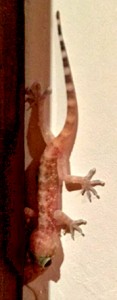 It is—plainly—the Dog Days of summer. When I got home from Calgary last night (at midnight), the first thing my husband said to me was, "Welcome to Hell!" It was 117 degrees (F.) last Friday (which was OK, because I was in Calgary, where the inhabitants kept apologizing for the <ahem> "heat" (it was about 85)), and 112 or so today.
It is—plainly—the Dog Days of summer. When I got home from Calgary last night (at midnight), the first thing my husband said to me was, "Welcome to Hell!" It was 117 degrees (F.) last Friday (which was OK, because I was in Calgary, where the inhabitants kept apologizing for the <ahem> "heat" (it was about 85)), and 112 or so today.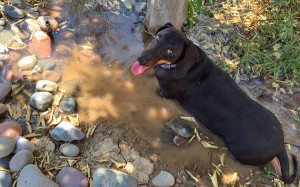
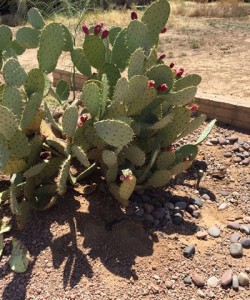
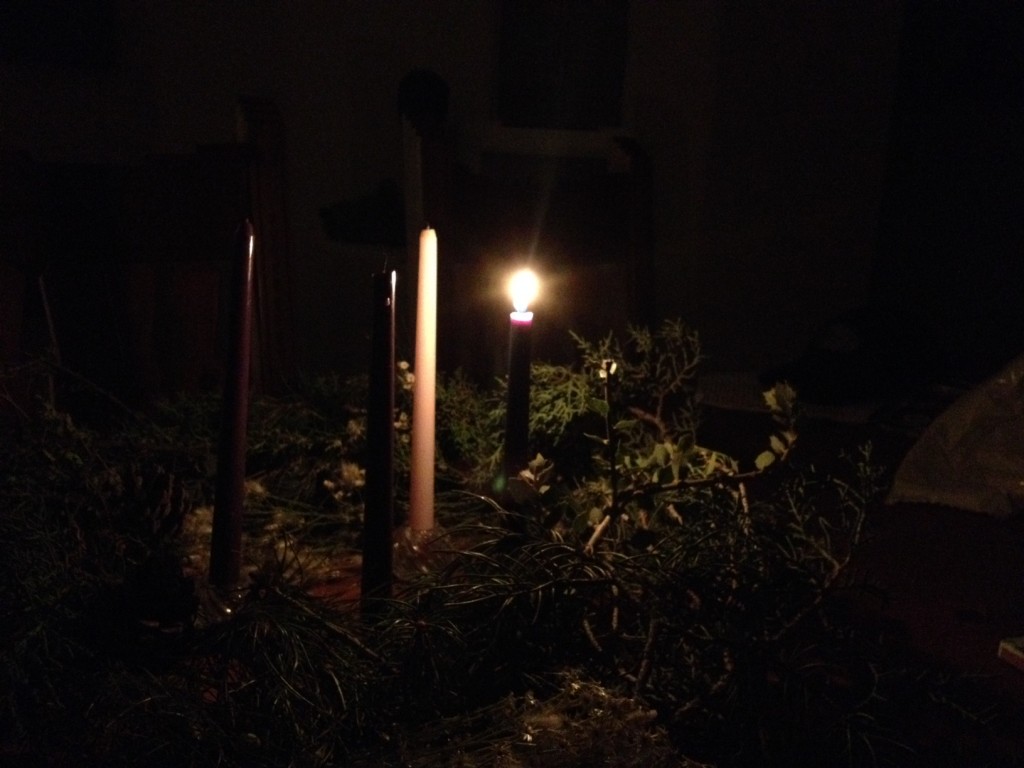
 Since book-touring is done (thank GOD!) and the show is on hiatus, we have a bit of time to stop, think, and catch up on the email…
Since book-touring is done (thank GOD!) and the show is on hiatus, we have a bit of time to stop, think, and catch up on the email…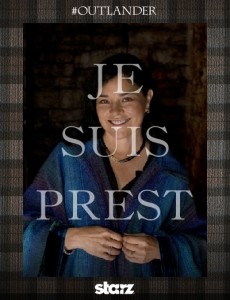
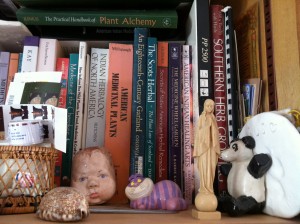
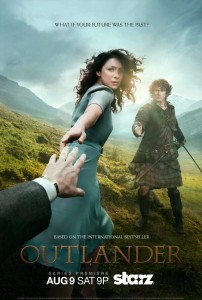 So, Sony was previewing all of their new shows (eight in all, I think, and I don’t recall all the names) for international (i.e., non-US) buyers. Each day had a different slate of buyers to view the shows (Latin America/Africa/MiddleEast/Europe, etc.), and every evening had a mix of fairly high-up TV executives from different countries for cocktails and dinner.
So, Sony was previewing all of their new shows (eight in all, I think, and I don’t recall all the names) for international (i.e., non-US) buyers. Each day had a different slate of buyers to view the shows (Latin America/Africa/MiddleEast/Europe, etc.), and every evening had a mix of fairly high-up TV executives from different countries for cocktails and dinner.